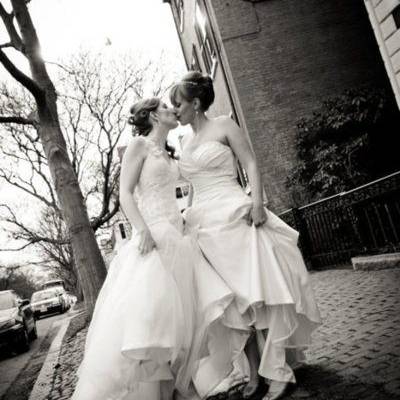 The “My Big Gay (Il)legal Wedding” contest has announced five winning couples have each won $5,000 toward the wedding of their dreams.
The “My Big Gay (Il)legal Wedding” contest has announced five winning couples have each won $5,000 toward the wedding of their dreams.
My Big Gay (Il)legal Wedding was a contest open to all engaged gay couples that live in a state where same-sex marriage is not legally recognized. Teams entered to win a chance to have the ACLU plan the wedding of their dreams…in a nearby state where gay marriage is legal. Same-sex couples across the country submitted their wedding ideas across state borders, including a hot air balloon ride from Texas and a carriage ride from Tennessee. Since their home states do not recognize same-sex marriage, the couple needs to cross state lines and marry in another state that will legally recognize the love they share, which is the exact inequality this contest aims to expose. This is the ACLU’s latest effort to bring to light the absurd arbitrariness of marriage laws in the United States. Curve caught up with Selene Kaye, the National Marriage Campaign Manager with the ACLU.
Could you tell me how ACLU designed this project and began preparing for it?
We designed the “My Big Gay (Il)legal Wedding” campaign to call attention to the patchwork of state laws that allow same-sex couples to marry in 17 states and the District of Columbia but deny those couples that same freedom in the other 33 states. We’ve made great strides in recent years, but millions of Americans are still denied the fundamental freedom to marry the person they love.
The campaign is about highlighting the stories of couples who cannot marry in their home states – and even when they cross state lines to marry, their relationships are not recognized or protected when they return home.
The Supreme Court’s historic ruling in the ACLU case, Windsor v. the United States, striking down the heart of the so-called Defense of Marriage Act, was a real tipping point in the movement. We realized that we had to redouble our efforts to change hearts and minds as a part of our strategy to bring the freedom to marry nationwide.
Marriage equality is outlawed in the five states where these couples currently reside; why do you think these states are not on the bandwagon for marriage equality?
Our country has been on an incredible journey regarding marriage for same-sex couples. Shifting attitudes and progress are evident in the courts, legislative victories, and public opinion polls showing that a substantial majority in every region of the country support the freedom to marry. But we still have a lot of work to bring this freedom to the entire country. As more people get to know gay and lesbian couples and have the conversations this campaign is sparking, I’m confident that more states will embrace the direction of fairness in which the nation is moving.
ACLU will provide up to $5,000 for the marriages, but where will the money come from?
In addition to our robust campaign involving legislative advocacy, ballot campaigns, and litigation, the ACLU has committed funds for public education, which is a critical component of the path to securing the freedom to marry.
What do you propose will happen once couples return to their respective states? What measures is ACLU going to put into place to allow the recognition of these marriages?
The ACLU and our supporters will not rest until all 50 states allow all people to marry the person they love. Through ongoing litigation in Virginia, Pennsylvania, North Carolina, Oregon, Ohio, Wisconsin, Florida, Indiana, Missouri, Michigan and Utah, and public education campaigns in Arizona, Nevada, Colorado, Michigan, Ohio, Oregon, Pennsylvania, Virginia, Utah, and New Mexico, the ACLU is working to bring the freedom to marry to every state and relegate discrimination against gay and lesbian couples to the dustbin of history.
As the contest comes to a close, where do you see the expansion of this project going? Perhaps to other countries where same-sex marriage is illegal?
We continue to engage many couples who entered the contest in our ongoing advocacy to bring the freedom to marry to every state. Many of them have been outspoken in their hometowns and conditions, and their stories will continue to help push the public – and public officials – forward on this issue.
ACLU’s goal for this contest is to put a human face to the marriage inequality occurring in various states. Does ACLU have a plan regarding when they want all states to accept same-sex marriage?
Within the next few years, the U.S. Supreme Court will have another opportunity to consider the question of marriage for same-sex couples. We are working in the courts, in state legislatures, at the ballot box, and changing hearts and minds to make sure that when that day comes, the Justices will know that not only is granting the freedom to marry constitutional, it is also what the American people believe is the right thing to do.
Are federal judges to blame for the ban on same-sex marriages in certain states?
The bans on marriage for same-sex couples that currently exist in 33 states came about through state legislatures and amendments to state constitutions. Some state courts have struck down earlier bans, and a string of federal courts have struck down some of the 33 state bans, although those rulings have stayed pending review by higher courts. But, big picture, the country has come a long way since most state marriage bans were passed about ten years ago.
Throughout our history as a nation, we have evolved on many issues regarding freedom and justice. The shift in attitudes towards marriage for same-sex couples has been a matter of people coming to understand that LGBT people are our family members, friends, and neighbours who want to marry for the same reasons as everyone else: to share a life and to be there for each other in good times and bad.
There have been many beautiful victories for same-sex marriages in many states. Did you ever imagine that this would happen in our lifetime?
In the last 16 months alone, we’ve gone from six states (plus D.C.) embracing marriage for same-sex couples to 17, and federal judges in eight states have ruled to overturn state constitutional bans. I did not expect to see so much progress so quickly, but decades of work have laid the foundation for this incredible moment. And a massive part of that has been the many brave people speaking out and telling their stories.
Info: https://weddings.aclu.org/#winning-couples


